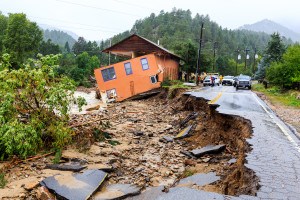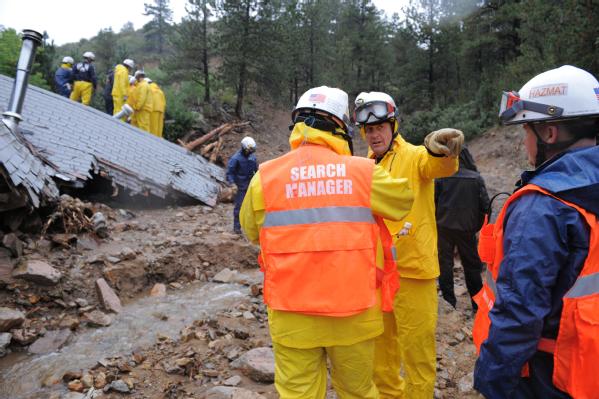Record flooding last fall washed away Sal Coppolecchia’s home in Lyons, forcing him to cut back on expenses as he figures out how to rebuild.
Gone are comforts such as satellite television. He switched to a cheaper health insurance plan and stopped buying vitamins.
“You gotta cut back on everything. There’s only so much money,” the 59-year-old said Monday.
Coppolecchia, who is living with relatives, is among the homeowners who will benefit from a bill signed into law Saturday that calls for the state to pay the property taxes of people who lost their homes in Colorado floods or wildfires last year.

Without the bill, Coppolecchia would have been on the hook for a $1,670 tax bill on a property where a giant hole has replaced his home. Only his garage is standing.
“Anytime a few dollars doesn’t have to come out of your pocket is fantastic,” said Coppolecchia, who is waiting to find out whether he can rebuild on his property.
Gov. John Hickenlooper signed the bill in Lyons, one of the places hardest hit by flooding. He also signed four other bills dealing with last year’s disasters.
One bill will distribute $5 million in grants to remove flood debris from watersheds. Another exempts out-of-state disaster workers from Colorado income taxes.
The two other measures earmark construction funding for flood-damaged schools and budget $17 million in grants for repairs to damaged wastewater and drinking water systems.
The September floods struck parts of northern Colorado, starting in the foothills and spreading onto the plains. Nearly 2,000 homes were damaged or destroyed. Summer wildfires also had a devastating impact, destroying nearly 500 homes in El Paso County alone.
The property-tax forgiveness bill introduced by Democrats wasn’t an easy sell. It was the last bill lawmakers approved before adjourning May 7 after months of discussions about how much the state should pay in property taxes. Some lawmakers wanted to cover a prorated amount for the time after a home was destroyed.
In the end, lawmakers settled on paying for a full year, regardless of when a property was destroyed. The bill is expected to cost the state about $2.2 million.
“Of all the flood bills that came out this year, this is the only one that’s intended to directly help people who lost everything through no fault of their own,” Rep. Jonathan Singer, D-Longmont, said in a statement. He was a sponsor of the bill.
Was this article valuable?
Here are more articles you may enjoy.


 Poll: Consumers OK with AI in P/C Insurance, but Not So Much for Claims and Underwriting
Poll: Consumers OK with AI in P/C Insurance, but Not So Much for Claims and Underwriting  Oregon Schools Sued for $9M After Young Girl Allegedly Raped
Oregon Schools Sued for $9M After Young Girl Allegedly Raped  California Chiropractor Sentenced to 54 Years for $150M Workers’ Comp Scheme
California Chiropractor Sentenced to 54 Years for $150M Workers’ Comp Scheme  Travelers Survey: Distracted Drivers Making US Roads More Dangerous
Travelers Survey: Distracted Drivers Making US Roads More Dangerous 